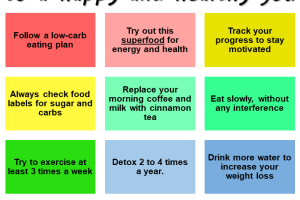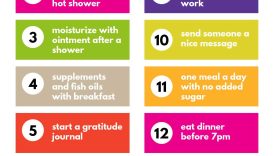The Ultimate Healthy Living Journey: Tips and Tricks for Success

Importance of Healthy Living
Healthy living is not merely a trend; it’s a crucial aspect of maintaining overall well-being. With increasingly busy lifestyles, many individuals often overlook their health, resulting in long-term consequences. Engaging in healthy habits enhances one’s quality of life, boosts energy levels, and improves emotional stability. For instance, after adopting a healthier diet and starting a regular exercise routine, one may experience significant improvements in mood and productivity at work. Key benefits of healthy living include:
- The Ultimate Healthy Living Journey: Tips and Tricks for Success
- Importance of Healthy Living
- Setting Realistic Goals
- Nutrition
- Balanced Diet
- Meal Planning
- Exercise
- Types of Workouts
- Creating a Fitness Routine
- Mental Health
- Stress Management
- Practicing Mindfulness
- Sleep
- Importance of Quality Sleep
- Tips for Better Sleep
- Hydration
- Benefits of Drinking Water
- How to Stay Hydrated Throughout the Day
- Self-Care
- Importance of Self-Care
- Self-Care Practices to Incorporate
- Social Connections
- Building a Support System
- Balancing Social Relationships
- Healthy Habits
- Daily Routines
- Breaking Bad Habits
- Tracking Progress
- Benefits of Tracking
- Different Methods for Tracking Success
- Improved physical health: Reduces the risk of chronic diseases like obesity, diabetes, and heart disease.
- Enhanced mental clarity: A balanced diet and regular exercise promote better cognitive function.
- Stronger immune system: Proper nutrition and exercise contribute to a more resilient body.
Setting Realistic Goals
To embark on a successful journey toward healthy living, it’s essential to establish realistic goals. Ambitious goals can lead to frustration and burnout if not achieved. Instead, consider the SMART criteria—Specific, Measurable, Achievable, Relevant, and Time-bound. For example, rather than aiming to “lose weight,” a more realistic goal could be “to lose 5 pounds in two months by exercising twice a week and eating more fruits and vegetables.” This clarity helps individuals stay motivated while making gradual and sustainable changes to their lifestyle.
Nutrition
Balanced Diet
A balanced diet is a cornerstone of healthy living. It provides the necessary nutrients needed for the body to function optimally. By incorporating a variety of food groups, one can ensure their body receives essential vitamins and minerals. Consider the “plate method” as a simple guide to a balanced meal:
- 50% Vegetables and Fruits: Aim for a rainbow of colors to maximize nutrient intake.
- 25% Whole Grains: Such as brown rice, quinoa, or whole-grain pasta.
- 25% Proteins: Choose lean meats, fish, legumes, and nuts.
An example could be a stir-fried vegetable dish served with brown rice and grilled chicken, providing a satisfying and nutrient-rich meal.
Meal Planning
Meal planning is an effective strategy to maintain a balanced diet. By organizing meals ahead of time, individuals can avoid unhealthy last-minute choices. Here are some tips for effective meal planning:
- Set Aside Time Weekly: Dedicate 1-2 hours to plan and prep meals.
- Use a Template: Create a weekly planner to outline meals for each day.
- Batch Cooking: Prepare larger portions to save time and ensure healthy options are readily available.
Implementing these strategies not only saves effort but empowers individuals to make healthier choices consistently. By being proactive about nutrition, one can cultivate stronger habits and support a healthier lifestyle.
Exercise
Types of Workouts
Incorporating a variety of workouts is crucial for a well-rounded fitness regime. Different types of exercise serve unique purposes, and discovering what works best can enhance motivation and results. Here are some popular workout categories:
- Cardiovascular Exercise: Activities like running, cycling, or swimming boost heart health and endurance.
- Strength Training: Weight lifting or bodyweight exercises like push-ups build muscle and flexibility.
- Flexibility and Stretching: Yoga or Pilates improve flexibility, balance, and relaxation.
- High-Intensity Interval Training (HIIT): Short bursts of intense activity followed by rest help burn fat and improve fitness quickly.
Creating a Fitness Routine
Designing a sustainable fitness routine involves selecting a mix of these workouts. Begin by assessing personal preferences and schedules. For instance, if mornings are less hectic, consider early workouts, combining 30 minutes of cardio with two strength sessions per week. Here’s a sample weekly routine:
- Monday: 30 minutes of jogging
- Wednesday: Strength training (upper body)
- Friday: Yoga class
- Saturday: HIIT session
By sticking to a routine that aligns with personal goals and interests, individuals can cultivate a lasting habit of regular exercise, enhancing both physical and mental well-being.
Mental Health
Stress Management
Managing stress is integral to maintaining overall mental health. Regular exercise and a balanced diet can significantly alleviate stress, but incorporating specific stress management techniques can further enhance emotional well-being. For instance, practicing deep breathing exercises can be a quick and effective way to calm the mind and body. Consider trying these simple strategies:
- Time Management: Prioritize tasks to avoid last-minute pressure.
- Breaks: Schedule short breaks during work to recharge.
- Hobbies: Engage in activities you love, such as reading or painting.
By actively addressing stress, individuals foster a more serene and productive mindset.
Practicing Mindfulness
Incorporating mindfulness into daily routines can further promote mental wellness. Mindfulness encourages individuals to engage fully in the present moment, reducing anxiety and enhancing awareness. Here are a few ways to practice mindfulness:
- Meditation: Spend 5-10 minutes daily in meditation to clear the mind.
- Mindful Eating: Focus on the taste and texture of food without distractions.
- Nature Walks: Go for walks and fully immerse yourself in the sights and sounds around you.
By making mindfulness a regular practice, people can cultivate a sense of peace, enhancing not only their mental health but their overall quality of life.
Sleep
Importance of Quality Sleep
Quality sleep is crucial for both mental and physical health. It provides the body with the necessary time to recover, repair, and rejuvenate. When individuals consistently get good sleep, they often notice improvements in mood, cognitive function, and overall energy levels. For instance, after a week of prioritizing sleep, many report feeling more alert and focused, allowing them to tackle daily tasks more efficiently. The National Sleep Foundation emphasizes that adults should aim for 7-9 hours of sleep each night to support optimum health.
Tips for Better Sleep
Improving sleep quality isn’t just about the hours clocked in bed; it’s also about the conditions that lead to restful sleep. Here are some tips to enhance sleep quality:
- Create a Sleep Schedule: Go to bed and wake up at the same time every day, even on weekends.
- Limit Screen Time: Avoid screens at least an hour before bedtime to reduce blue light exposure.
- Comfortable Environment: Make your bedroom cozy—consider blackout curtains, a cool temperature, and a comfortable mattress.
- Relaxation Techniques: Engage in calming activities such as reading or taking a warm bath before bed.
By implementing these tips, individuals can cultivate a sleep environment that fosters deep, restorative rest, thereby enhancing their overall health and well-being.
Hydration
Benefits of Drinking Water
Staying adequately hydrated is fundamental for optimal health. Drinking enough water provides numerous benefits, including enhancing physical performance, improving digestion, and even supporting skin health. For instance, after committing to proper hydration, many people notice their skin appears more youthful and radiant. Here are some key benefits of drinking water:
- Regulates Body Temperature: Helps maintain a stable internal temperature during exercise or hot weather.
- Suppresses Appetite: Drinking water before meals can create a sense of fullness, aiding in weight management.
- Boosts Energy: Dehydration can lead to fatigue and decreased alertness, while hydration enhances focus and productivity.
How to Stay Hydrated Throughout the Day
To ensure proper hydration, it’s essential to incorporate water into daily routines. Here are some practical tips:
- Carry a Water Bottle: Keep a reusable water bottle handy to sip throughout the day.
- Set Reminders: Use phone alarms or apps to remind yourself to drink water regularly.
- Infuse Flavor: Add fruits or herbs to water — like lemon or mint — to make it more enjoyable.
- Track Intake: Consider using a hydration tracking app to monitor daily water consumption.
By making a conscious effort to stay hydrated, individuals can experience improved energy levels, enhanced focus, and overall better health.
Self-Care
Importance of Self-Care
Self-care is a vital aspect of maintaining overall well-being and mental health. In today’s fast-paced world, many individuals neglect their own needs, which can lead to burnout and increased stress levels. Prioritizing self-care allows one to recharge and rejuvenate, ultimately enhancing productivity and happiness in daily life. For example, after dedicating a weekend to self-care practices, many report feeling more balanced and capable of handling daily challenges. Key reasons to embrace self-care include:
- Improved Mood: Engaging in self-care can significantly elevate one’s mood and reduce feelings of anxiety.
- Enhanced Relationships: When one practices self-care, they often find it easier to connect and communicate with others.
- Increased Energy: Taking time for oneself can boost energy levels, making daily tasks feel more manageable.
Self-Care Practices to Incorporate
Incorporating self-care into daily routines doesn’t have to be complicated. Here are some effective self-care practices:
- Mindful Journaling: Spend a few minutes each day reflecting on thoughts and feelings.
- Digital Detox: Allocate time away from screens to mentally unwind and focus on the present.
- Nature Walks: Take a stroll in a natural setting to clear the mind and enjoy the outdoors.
- Creative Activities: Engage in hobbies like painting, knitting, or cooking that bring joy and fulfillment.
By recognizing the importance of self-care and actively integrating these practices, individuals can foster a healthier mindset and improve their overall quality of life.
Social Connections
Building a Support System
Creating a strong support system is essential for emotional well-being. Having reliable friends and family members to turn to during difficult times can make a significant difference in coping with stress. Personally, making an effort to reconnect with old friends has led to invaluable support during life’s challenges, reminding me of the power of connection. To build an effective support network:
- Reach Out: Don’t hesitate to message or call friends and family just to catch up.
- Join Groups: Consider local clubs or online communities that align with interests or hobbies.
- Be Vulnerable: Share your thoughts and feelings; authentic connections often stem from vulnerability.
Balancing Social Relationships
While nurturing social connections is important, finding balance in relationships is equally crucial. Over-committing can lead to feelings of resentment or exhaustion. Here are some strategies for maintaining balanced relationships:
- Set Boundaries: Learn to say no when feeling overwhelmed to protect your time and energy.
- Quality over Quantity: Focus on deepening fewer relationships rather than spreading yourself too thin.
- Schedule Downtime: Ensure time for yourself amidst social commitments to recharge.
By intentionally building a supportive network and nurturing balanced relationships, individuals can enhance their overall well-being and cultivate happier, healthier connections.
Healthy Habits
Daily Routines
Establishing daily routines is a powerful way to instill healthy habits into everyday life. A well-structured routine provides stability and ensures that essential tasks are consistently accomplished. For example, when I incorporated morning stretches and a healthy breakfast into my routine, I noticed a remarkable boost in my energy and focus throughout the day. Here are some tips for creating a beneficial daily routine:
- Begin with Mornings: Start each day with a calming ritual, like meditation or light exercise.
- Set Specific Times: Designate times for meals, workouts, and relaxation to create structure.
- End with Reflection: Spend a few minutes each evening reviewing the day and setting intentions for tomorrow.
Breaking Bad Habits
Breaking bad habits is equally vital for fostering a healthy lifestyle. Often, these habits can sap energy and hinder personal growth. To successfully break free from negative patterns, it’s essential to identify triggers and replace them with positive alternatives. Consider the following strategies:
- Start Small: Focus on one habit at a time to avoid feeling overwhelmed.
- Track Progress: Keeping a journal to track successes and setbacks can provide valuable insights.
- Find Support: Share your goals with friends or join a support group for accountability.
By incorporating disciplined daily routines and consciously working to break bad habits, individuals can enhance their well-being and create a more fulfilling life.
Tracking Progress
Benefits of Tracking
Tracking progress is an essential step in achieving health and wellness goals. By consistently monitoring changes, individuals can gain valuable insights into their habits and patterns. Personally, I’ve found that maintaining a tracker led to increased motivation and accountability, especially during challenging times. Benefits of tracking include:
- Increased Awareness: Observing habits helps pinpoint what works and what doesn’t.
- Motivation Boost: Seeing progress, no matter how small, can be incredibly motivating.
- Customized Approach: Tracking allows for adjustments to be made, ensuring strategies align with personal needs.
Different Methods for Tracking Success
There are various effective methods for tracking progress toward goals, each catering to individual preferences. Consider these options:
- Journaling: Write daily entries reflecting on achievements, challenges, and feelings.
- Apps: Utilize health- or fitness-tracking apps that log workouts, meals, and hydration.
- Spreadsheets: Create a personalized spreadsheet to monitor goals in an organized manner.
- Habit Trackers: Use simple charts or sticker systems to visually track daily habits.
By embracing these tracking methods, individuals can maintain a clearer vision of their journeys while celebrating progress along the way.





